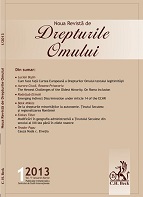Emerging Indirect Discrimination under Article 14 of the ECtHR
Emerging Indirect Discrimination under Article 14 of the ECtHR
Author(s): Rodoljub EtinskiSubject(s): Politics / Political Sciences
Published by: Centrul de Studii Internationale
Keywords: indirect discrimination; disadvantaged groups; Article 14 of the ECtHR; European Court of Human Rights
Summary/Abstract: The ECtHR confirmed that Article 14 of the ECtHR prohibits also indirect discrimination. Indirect discrimination consists of prejudicial effects produced by apparently neutral rule, general policy or measures that disproportionally or exclusively affect members of a group, which is particularly protected by European anti-discrimination law, such as a gender group of minorities. A different treatment may be justified by legitimate aims if means used for their achievement are proportional to the aims. In determination of the aims and selection of means for their achievements States enjoy certain margin of appreciation. A broadness of the margin depends on social field of State's activity and on the group of different treatment. Some groups, like race on ethnic origin, permit very narrow margin of appreciation. Having in mind diversity of elementary education in Europe, States enjoy broad discretion in respect of organising primary education. However, segregation of children in primarily schools on any group has to be justified by extremely weighty reasons. It is the case especially when segregation affects disproportionally or exclusively members of an ethnic group. Separation of children in schools ia a problem by itself. In Brown v. Board of Education, the US Supreme Court overruled “separate but equal” doctrine that had been in force in US school system. The Court decided that separation of the “Negro” and white schools which were completely equalized with respect to buildings, curricula, qualifications and salaries of teachers, and other “tangible” factors had detrimental effects upon the coloured children. It adjudged that separate educational facilities were inherently unequal. The concept of indirect discrimination under Article 14 of the ECtHR will strengthen an obligation of a State to correct inequality in enjoyment of rights and freedoms, guaranteed by the inferior social position is a result of inherited long lasting discriminatory processes.
Journal: Noua Revistă de Drepturile Omului
- Issue Year: 9/2013
- Issue No: 1
- Page Range: 26-34
- Page Count: 9
- Language: English

